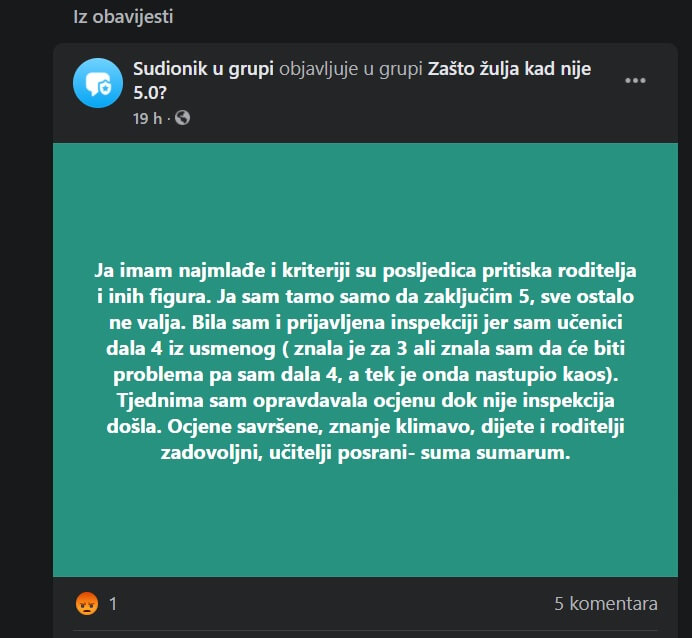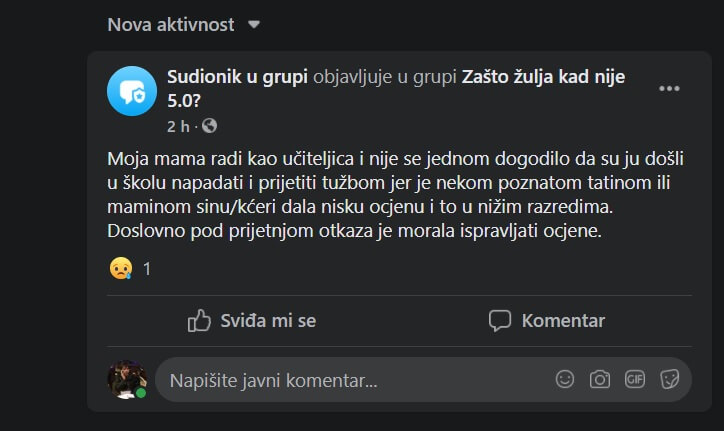Survey Shows Young People Hide Their LGBTIQ Identity in High School
ZAGREB, 6 April 2022 - LGBTIQ high school students in Croatia hide their identity and more frequently experience violence when at college, and lack system support, shows the first national survey on the experience of young LGBTIQ persons in education and the importance of support.
The survey was conducted by psychologist Marina Štambuk in cooperation with the Rainbow Families association and the Rijeka-based lesbian organisation "Lori", and it covered 373 respondents aged 15-30.
The research shows that young people on average become fully aware of their LGBTIQ identity at the age of 14, that they reveal their sexual identity more frequently to their mother than their father, and that in contact with new persons more than half hide their identity.
More than half of the respondents said that they had encountered a situation during high school in which LGBTIQ persons were mentioned in a negative context, in class or in education materials, while one in three said they had experienced such situations a number of times or frequently.
During their high school young LGBTIQ people more frequently experienced negative comments from their peers compared to university, and as many as 20% experienced verbal violence from teaching staff in high school.
As many as 77% of young LGBTIQ persons do not know who to report violence to if they experience it in high school.
Most said the best kind of support during high school would be sexual education as part of classes, which would also include LGBTIQ topics.
The research was conducted as part of a project for inclusive education, implemented by the said associations and the Norwegian organisation Norsensus Mediaforum.
Most of the respondents came from Zagreb, Rijeka, Split, Varaždin and Pula.
For more, check out our lifestyle section.
Croatian Teachers Under Pressure: Angry Parents Behind Straight A Pupil Epidemic?
September 8, 2021 - The flood of straight-A pupils in Croatian elementary schools sadly isn't a sign of brilliance but of Croatian teachers being put under pressure by parents who want their kids to go to the best high schools in the country. The newly launched Facebook group wants to get to the bottom of fake A's, offering Croatian teachers a place for anonymous confessions.
Parents naturally want their best for their children and want to see them succeed and have the best life possible. The smarter the child, the better things will be for them, many would conclude. If a child is like that middle child from the show ''Malcolm in the Middle'', bright enough to be the master of everything you throw at him, be it maths, language, physics, or history, he should be able to sail through life worry-free, right? Well, maybe.
In reality, such gifted individuals, if actually real, are truly rare. However, you wouldn't think that if you were to see the grades of some Croatian pupils, with a large number of them getting straight A's. Unfortunately, this is a distorted picture of reality.
''I teach the youngest kids, and the criteria is owed to the parental pressure. I'm there just to hand out A's. Nothing else is good enough. I was even reported to the inspection because I gave one pupil a B (she was a C, but I knew there would be a problem so I gave her a B, and then chaos began). I justified giving her that grade for weeks with the threat of inspections hanging over my head. The grades are perfect, the knowledge not so much, the kid and their parents are happy, and the teachers crapped all over,'' reads a thread from one of the increasingly pressured Croatian teachers on the recently launched Facebook group ''Why Does it Itch When it's Not 5.0?'' (Zašto žulja kad nije 5.0?).

FB thread translated above, screenshot / Zašto žulja kad nije 5.0?
The flood of straight-A students (or, in Croatian terms, those kids with an average of 5.0, meaning they passed all subjects with a 5, Croatian for A), has been sporadically addressed in the Croatian media over the past few months as elementary school pupils were heading off to their high schools. So many straight A pupils have their results rated as unrealistic and the parental pressure placed on Croatian teachers and professors is seen as what's to blame.
A grades given as a gift and not as a true measure of a child's knowledge was something that was even addressed in the curriculum reform and is waiting to be fully implemented. With high school admissions coming to a close, the situation has since gone rather quiet.
But, then, famous Croatian investigative journalist Ivana Paradžiković published a Facebook thread expressing dissatisfaction that her ''4.8 son'' didn't managed to get accepted into high school in any of the six gymnasiums he applied for, as they were accepting only those kids with a grade of 5.0 in the new school year. She stated that her son was good enough for the European Film Academy but apparently not for the Croatian education system.
''He had the misfortune of going to a school where an A grade wasn't given away, and it was important to the professors that instead, they actually teach kids something. Over there, 4.4 is a B and not an A, and to me, that was always normal and acceptable (...) several classes with 30 pupils each with a straight A grade and nobody finds that unusual nor alarming... The education system is the foundation of the society,'' wrote the rightfully unhappy Paradžiković, as reported by Jutarnji List.
Paradžiković's thread, as well as the previous media coverage of the straight A epidemic across many Croatian schools, triggered freelance journalist Matina Tenžera to start a Facebook group which discusses the matter. The group consists of 249 members at the time of writing this article.
''I want to survey public opinion about this issue. Some say it's the fault of the system, but that's a bit too abstract. I want to find out how much parents really do push their children, is it truly such a big issue or maybe it's blown out of proportion?'' Tenžera said to TCN.
The group invites Croatian teachers to share their inside stories on parental pressure and generally what stands behind this unrealistic picture of the success of Croatian pupils on paper. The response so far is small, but Tenžera hopes that interest will grow. As TCN previously reported, Facebook groups that share anonymous confessions played a crucial role in revealing sexual harassment in the Croatian higher education system, mainly at the acting academy in Zagreb and other parts of the wider region.
Still, the small amount of threads gathered by Tenžera's group already reveals some true horror stories about how teachers in Croatia are perceived more as slaves than as valued individuals tasked with properly preparing the next generation for adulthood out there in the big wide world.
''My mother works as a teacher, and the situation in which someone came to school to attack and threaten to sue her because she gave a low grade to the child of someone famous has happened more than once. She literally had to remove the grade under the threat of getting fired,'' reads one anonymous confession.

FB thread translated above, screenshot / Zašto žulja kad nije 5.0?
Tenžera wants to learn just why Croatian schools and their headmasters don't take a stand and explain to parents that a good grade needs to be worked for and earned.
''I'm just a layman, but I hope that experts and experienced teachers will join the group and provide some of their solutions,'' says Tenžera.
Zagreb's Vladimir Prelog Science School and Mathematical Gymnasium (MIOC) has already taken to the practice of having entrance exams to settle the difference between talented pupils on paper and actual talented pupils.
Introducing and valuing entrance exams more than elementary school grades is one solution Tenžera believes could work, but as she points out, she isn't an expert. So, she hopes the Facebook group will encourage discussion for those who are educated, trained, and qualified to discuss education issues.
The following days will reveal whether or not this Facebook group grow into a bigger voice protesting against unfair and unethical practices in the Croatian education system and the abuse of Croatian teachers.
Meanwhile, in the first week of the new school year in Croatia, pupils are back in their classrooms learning about the world around them. However, the lesson of honesty and getting only what you work hard for is a lesson only their families can teach. Not threatening teachers for giving grades that are a realistic, professional evaluation of knowledge is lesson number one.
Read about Croatian politics and history since 1990 on our TC guide.
For more about education in Croatia, follow TCN's dedicated page.
Lovro Mirković Wins Bronze Medal at the International Biology Olympiad
July 31, 2021 - One more medal for Croatia, and not from Tokyo, after Lovro Mirković, a high school student from Zagreb, won a bronze medal at the International Biology Olympiad.
As reported by Index.hr, four Croatian high school students participated in the 32nd International Biological Olympiad, which took place from 18 to 23 July, and Lovro Mirković from the XV Grammar School in Zagreb won a bronze medal, announced the Faculty of Science in Zagreb.
Students Lukas Grbac Lacković from the Vladimir Prelog School of Natural Sciences in Zagreb, David Špiljak from the Andrija Mohorovičić High School in Rijeka, and 2nd-grade students Đurđica Kovačić from the III High School in Split and Lovro Mirković from the XV High School in Zagreb took part in the Olympiad.
Lovro Mirković won the bronze medal with 77.5 percent of the exam, while Lukas Grbac Lacković received an award for an exceptional result of 70.3 percent.
This year, Mirković also won one gold medal at the EOES (European Olympiad in Experimental Science) and participated in Mendeleev's Chemistry Olympiad.
"Four representatives were selected on the basis of exclusion testing, which took place on May 30. This year, students were trained by professors and students of the Department of Biology at the Faculty of Science from July 12 to 17. The leaders of the Croatian team were Andreja Lucic and Petra Cvjetko", read the publication.
The International Biology Olympiad (IBO) has been held every year since 1990, and this year it was organized online due to the coronavirus pandemic.
"Croatia participated in the IBO 2018 in Iran, 2019 in Hungary, and this year (when it was to be held in Portugal), and we have a total of 4 bronze medals and one silver. This year's Olympics was attended by 77 countries with 304 competitors ", reads the announcement.
The host country of the next Biological Olympiad is Armenia.
The exam consisted of two theoretical and three practical parts, but this year due to the online environment it had only one theoretical and one theoretical-practical part, which were physically held at the biological department of the Faculty of Science.
For more, follow our Made in Croatia section.


